Apple's March Event: the future of TV, games and news
To clarify where Apple is headed in television, it's useful to look back on what it's already done, and what it has intentionally avoided.
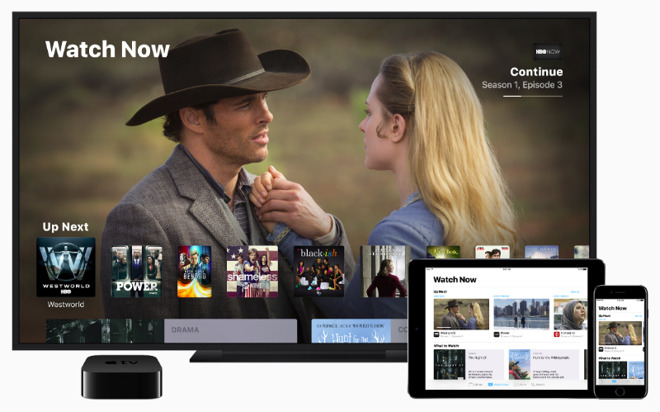
Apple TV, TV App, and its iOS mobile TVs
Munster has long been the pinnacle of wrong in his analysis of Apple and the television market, to the point where it is a widely recognized joke that Munster perpetually predicted that Apple would "ship a television that cost twice as much everyone else's, and make tons of money on it" any minute now.
Munster's predictions were not only wrong over and over, but farcically absurd and simplistically unsophisticated at the core, making him the perfect source for Bloomberg to cite in its own ridiculous hit piece mocking Apple TV as both a failure and, supposedly, "central to Apple's Services," a wildly delusional portrayal of where Apple's Services revenues actually come from (hint: it's not movie downloads).
Here's an accurate look at what Apple has actually done in television, and where it appears to be headed.
It's almost hard to remember, but when Apple TV first shipped, Apple's entire TV strategy was playing out within iTunes 6, which had just introduced purchasing and viewing videos (starting with just a few TV shows from Disney, Pixar's short films and music videos). Viewing videos was largely aimed at the 5G iPod that provided an on-the-go way to watch content at arm's length.
Steve Jobs announced at the time, "We're doing for video what we've done for music-- we're making it easy and affordable to purchase and download, play on your computer, and take with you on your iPod."
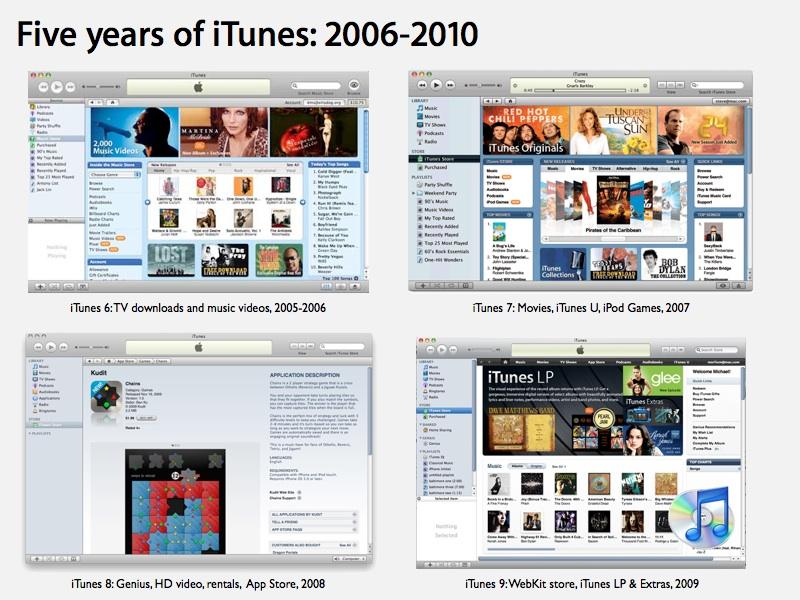
Between Apple TV and iPad, iTunes' video features grew increasingly sophisticated
Having developed the tech infrastructure, Apple also needed to line up more commercial content and more ways for users to actually watch iTunes video content. Macs had no problem playing videos, but sitting at a computer was not exactly competitive with relaxing in front of a living room TV.
Apple TV was intended primarily to serve that role, and it worked out a lot better than various efforts to ship a "converged" PC-TV hybrid. Rather than trying to be a computer, a television, a refrigerator, and a toaster, Apple TV simply aimed at bringing iTunes content to users' living rooms.
Apple continued to refer to Apple TV as a "hobby," particularly as its ambitions for the device were greatly overshadowed by the subsequent launch of the iPhone. Yet its development of technologies including AirPlay (a video expansion of the existing AirTunes music delivery protocol) and AirPlay Mirroring continued to make Apple TV more attractive as a product.
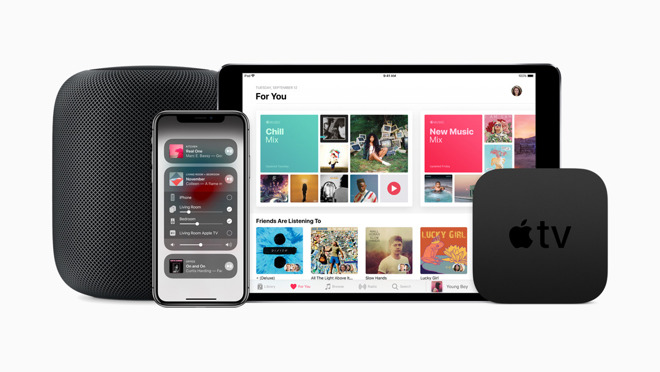
AirPlay 2
Today's AirPlay 2 continues to enhance the capacity of Apple TV, HomePod and other compatible hardware to stream content to multiple speakers throughout the home. In licensing AirPlay 2 to a variety of other speaker makers and in its new partnerships with Samsung and other television makers, Apple is making its ecosystem the preferred way to deliver and manage audio throughout the home.
Other technologies developed for and financed by iOS devices, including HTTP Live Streaming, have similarly been used in Apple TV, resulting in an increasingly tight integration between Apple's platforms. This also makes it easy for broadcasters and other streaming vendors to target Macs, iOS and tvOS devices using the same technology.
A final aspect of Apple TV that is often overlooked is its role in enterprise applications. Apple TV is easy to manage and customize for use in education, healthcare, hospitality, and corporate conference rooms, featuring easy to use streaming and mirroring and supporting custom enterprise apps.
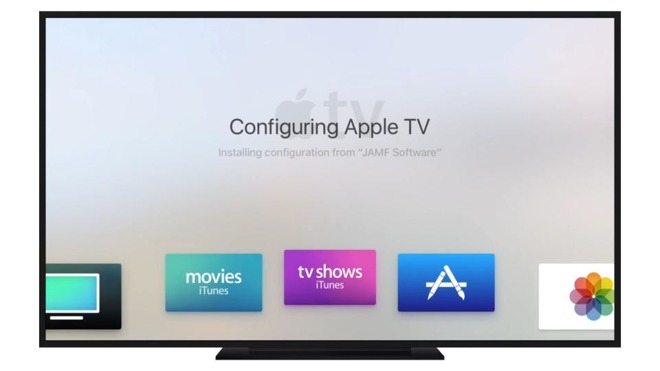
Apple TV uniquely supports enterprise management tools
While it officially launched before iPhone, Apple TV didn't get its own App Store until much later: 2015, at the launch of tvOS. Until then, the only store for Apple TV was iTunes. Before rushing to put third-party apps on television, Apple pursued a much bigger opportunity presented by iPad, its other television.
Today, there is some historical revisionism that suggests Jobs saw iPad as little more than a digital magazine and therefore was a failure along with iPad for not "saving journalism." That's simply false. Our exhaustive review of the original iPad made it clear that iPad was a positioned as an ultra-mobile computer, not a digital periodical reader.
Almost two years after iPad's introduction, at the end of 2011, Apple launched Newsstand as an effort to enhance subscription journalism content to the iPad. That failed for a number of reasons, in part because many content publishers tried to scrape their existing, failed Adobe Flash-based digital media efforts into the market Apple created for them, resulting in a poor experience that turned off readers.
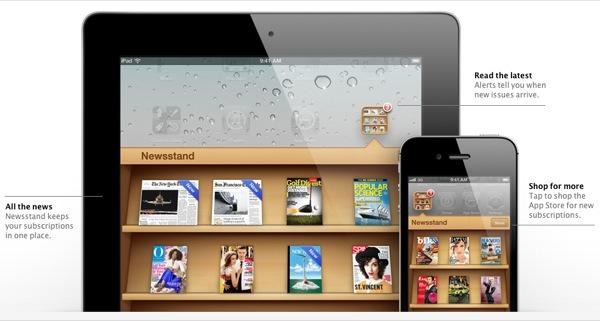
Newsstand attempted to draw attention to periodical-based app subscriptions, but most weren't designed well
Further, as with TV series and channels, there are so many magazine subscriptions to choose from that it grows overwhelming and expensive to try paying for each one individually. To address that issue on the TV side, Apple created its TV app, designed to serve as a navigation point for viewing the shows you find interesting, rather than having them all scattered across various apps and subscription services.
The TV app launched across both iOS and tvOS, creating a familiar, cloud-synced way to manage various options to watch. Over the past decade, it's become obvious that iPad and other tablets were overhyped in their potential to "save newspapers," yet under-appreciated in their role as a new class of sophisticated portable televisions.
In fact, most Android tablets were sold and used as passive portable TVs. Now that big phones can serve that role, Android tablets have collapsed. Apple stabilized its iPad business by developing it as a real computing platform capable of running tablet-optimized apps and games and giving it other specialized uses that big phones can't replace. That's something Google's Android and Microsoft Windows never really accomplished.
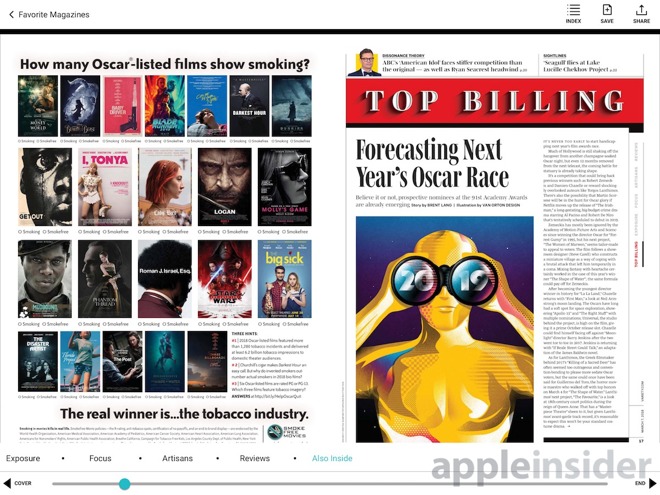
With its Texture and TV apps, Apple appears poised to launch new services that bundle content from lots of "apps" into a single subscription choice, putting one price on all the content a user can enjoy. This is the same model as Apple Music, which pays out content creators per song streamed.
Beyond music, TV, and magazines, Apple is likely to also create a similar subscription for games, allowing players to pay an ongoing fee to access a library of interactive content. This addresses issues with the visibility of individual downloads, keeps users up-to-date with the latest content being created, simplifies the payment structure, and pays out creators in a system of meritocracy.
In addition, these cloud-synched subscription services also tightly binds iOS devices-- and particularly iPads used to watch TV, videos, and play games-- with Apple TV and HomePod.
Once users are subscribed, they'll prefer to buy Apple hardware that works with their subscriptions, the same way that iOS, Keynote, and OS features like Messages help to keep Apple's ecosystems sticky and its own hardware more attractive than less functional commodity devices, even at a premium price.
With subscription gaming packages, future Apple TV boxes are likely to get more dedicated gaming hardware, including bundled controllers that make it more of a real games console. Apple should better promote custom apps that take full advantage of the tvOS platform, the same way iPad apps aren't just stretched iPhone titles.
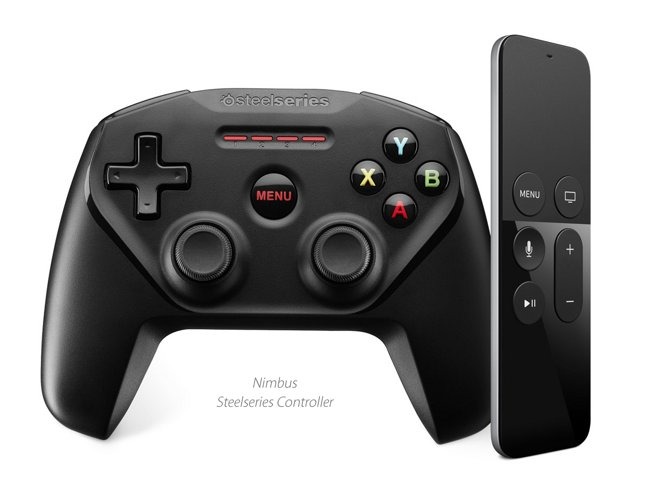
Apple TV has been constrained in gaming by its very simple bundled Remote and prohibitions against games requiring a real controller
If Apple can establish Apple TV as a real gaming console and not just a place for simple mobile apps trying to sell In-App Purchases, it will have an ideal foundation for launching Augmented Reality gaming and Virtual Reality experiences using new wireless hardware mounted on your face.
And while some have speculated that Apple might shrink down HomePod into a cheaper speaker, it's more likely that Apple would deliver a slimmed down version of its A10X-powered Apple TV hardware to work like a HomePod without a speaker. That would retain HomePod's position as a premium speaker while expanding its tech in new ways.
Such a product offering would effectively be a cheap wireless AirPlay 2 streamer that listens for Hey Siri commands and outputs audio to existing speakers, controls connected light fixtures, and can be used to monitor rooms in your house for things like air quality and movement.
A cost effective "HomePod nano" (or "Apple Radio") could be used to expand Siri and HomeKit functionality throughout the home without needing the 4K video or 4-inch speaker hardware that contributes much of the cost in Apple TV and HomePod, respectively.
Apple's focus for next Monday's event appears to be on its new subscription services. Stay tuned for AppleInsider coverage and share your thoughts in the comments below.

Apple TV, TV App, and its iOS mobile TVs
The idiot-boxing of Apple's TV strategies
Despite years of pundits-- lead by Gene Munster-- claiming Apple would get into the television set business or add a Tivo-like DVR to Apple TV, those predictions never materialized.Munster has long been the pinnacle of wrong in his analysis of Apple and the television market, to the point where it is a widely recognized joke that Munster perpetually predicted that Apple would "ship a television that cost twice as much everyone else's, and make tons of money on it" any minute now.
Munster's predictions were not only wrong over and over, but farcically absurd and simplistically unsophisticated at the core, making him the perfect source for Bloomberg to cite in its own ridiculous hit piece mocking Apple TV as both a failure and, supposedly, "central to Apple's Services," a wildly delusional portrayal of where Apple's Services revenues actually come from (hint: it's not movie downloads).
Here's an accurate look at what Apple has actually done in television, and where it appears to be headed.
Apple TV and AirPlay
Apple first launched Apple TV at an event in 2006, similarly tag-lined "it's showtime." Originally that product was, effectively, an iPod for your television. You could wirelessly sync over music, photos, and video content from your Mac to the box for watching on the big screen.It's almost hard to remember, but when Apple TV first shipped, Apple's entire TV strategy was playing out within iTunes 6, which had just introduced purchasing and viewing videos (starting with just a few TV shows from Disney, Pixar's short films and music videos). Viewing videos was largely aimed at the 5G iPod that provided an on-the-go way to watch content at arm's length.
Steve Jobs announced at the time, "We're doing for video what we've done for music-- we're making it easy and affordable to purchase and download, play on your computer, and take with you on your iPod."

Between Apple TV and iPad, iTunes' video features grew increasingly sophisticated
Having developed the tech infrastructure, Apple also needed to line up more commercial content and more ways for users to actually watch iTunes video content. Macs had no problem playing videos, but sitting at a computer was not exactly competitive with relaxing in front of a living room TV.
Apple TV was intended primarily to serve that role, and it worked out a lot better than various efforts to ship a "converged" PC-TV hybrid. Rather than trying to be a computer, a television, a refrigerator, and a toaster, Apple TV simply aimed at bringing iTunes content to users' living rooms.
Apple continued to refer to Apple TV as a "hobby," particularly as its ambitions for the device were greatly overshadowed by the subsequent launch of the iPhone. Yet its development of technologies including AirPlay (a video expansion of the existing AirTunes music delivery protocol) and AirPlay Mirroring continued to make Apple TV more attractive as a product.

AirPlay 2
Today's AirPlay 2 continues to enhance the capacity of Apple TV, HomePod and other compatible hardware to stream content to multiple speakers throughout the home. In licensing AirPlay 2 to a variety of other speaker makers and in its new partnerships with Samsung and other television makers, Apple is making its ecosystem the preferred way to deliver and manage audio throughout the home.
Other technologies developed for and financed by iOS devices, including HTTP Live Streaming, have similarly been used in Apple TV, resulting in an increasingly tight integration between Apple's platforms. This also makes it easy for broadcasters and other streaming vendors to target Macs, iOS and tvOS devices using the same technology.
A final aspect of Apple TV that is often overlooked is its role in enterprise applications. Apple TV is easy to manage and customize for use in education, healthcare, hospitality, and corporate conference rooms, featuring easy to use streaming and mirroring and supporting custom enterprise apps.

Apple TV uniquely supports enterprise management tools
While it officially launched before iPhone, Apple TV didn't get its own App Store until much later: 2015, at the launch of tvOS. Until then, the only store for Apple TV was iTunes. Before rushing to put third-party apps on television, Apple pursued a much bigger opportunity presented by iPad, its other television.
Apple's other TV
Initially mocked as being "a big iPod touch" by people who couldn't see its potential, Apple initially worked to position the iPad as a portable computer. The first apps it showed for iPad in 2010 were its own free Pages and Keynote titles, which clearly benefited from running on an iOS device bigger than iPhone.Today, there is some historical revisionism that suggests Jobs saw iPad as little more than a digital magazine and therefore was a failure along with iPad for not "saving journalism." That's simply false. Our exhaustive review of the original iPad made it clear that iPad was a positioned as an ultra-mobile computer, not a digital periodical reader.
Almost two years after iPad's introduction, at the end of 2011, Apple launched Newsstand as an effort to enhance subscription journalism content to the iPad. That failed for a number of reasons, in part because many content publishers tried to scrape their existing, failed Adobe Flash-based digital media efforts into the market Apple created for them, resulting in a poor experience that turned off readers.

Newsstand attempted to draw attention to periodical-based app subscriptions, but most weren't designed well
Further, as with TV series and channels, there are so many magazine subscriptions to choose from that it grows overwhelming and expensive to try paying for each one individually. To address that issue on the TV side, Apple created its TV app, designed to serve as a navigation point for viewing the shows you find interesting, rather than having them all scattered across various apps and subscription services.
The TV app launched across both iOS and tvOS, creating a familiar, cloud-synced way to manage various options to watch. Over the past decade, it's become obvious that iPad and other tablets were overhyped in their potential to "save newspapers," yet under-appreciated in their role as a new class of sophisticated portable televisions.
In fact, most Android tablets were sold and used as passive portable TVs. Now that big phones can serve that role, Android tablets have collapsed. Apple stabilized its iPad business by developing it as a real computing platform capable of running tablet-optimized apps and games and giving it other specialized uses that big phones can't replace. That's something Google's Android and Microsoft Windows never really accomplished.
More subscription content
After developing its own TV app, Apple last year acquired Texture, an app that provides package access to a variety of magazines with featured content curation and a consistent user interface. Apple's earlier Newsstand was simply a folder of disparate apps that each sold subscription content.
With its Texture and TV apps, Apple appears poised to launch new services that bundle content from lots of "apps" into a single subscription choice, putting one price on all the content a user can enjoy. This is the same model as Apple Music, which pays out content creators per song streamed.
Beyond music, TV, and magazines, Apple is likely to also create a similar subscription for games, allowing players to pay an ongoing fee to access a library of interactive content. This addresses issues with the visibility of individual downloads, keeps users up-to-date with the latest content being created, simplifies the payment structure, and pays out creators in a system of meritocracy.
In addition, these cloud-synched subscription services also tightly binds iOS devices-- and particularly iPads used to watch TV, videos, and play games-- with Apple TV and HomePod.
Once users are subscribed, they'll prefer to buy Apple hardware that works with their subscriptions, the same way that iOS, Keynote, and OS features like Messages help to keep Apple's ecosystems sticky and its own hardware more attractive than less functional commodity devices, even at a premium price.
More subscriber hardware
Just as iTunes created a role for Apple TV and Apple Music created a reason to buy HomePod, there are additional hardware form factors that could erupt from the expansion of Apple's Walled Garden of new subscription services.With subscription gaming packages, future Apple TV boxes are likely to get more dedicated gaming hardware, including bundled controllers that make it more of a real games console. Apple should better promote custom apps that take full advantage of the tvOS platform, the same way iPad apps aren't just stretched iPhone titles.

Apple TV has been constrained in gaming by its very simple bundled Remote and prohibitions against games requiring a real controller
If Apple can establish Apple TV as a real gaming console and not just a place for simple mobile apps trying to sell In-App Purchases, it will have an ideal foundation for launching Augmented Reality gaming and Virtual Reality experiences using new wireless hardware mounted on your face.
And while some have speculated that Apple might shrink down HomePod into a cheaper speaker, it's more likely that Apple would deliver a slimmed down version of its A10X-powered Apple TV hardware to work like a HomePod without a speaker. That would retain HomePod's position as a premium speaker while expanding its tech in new ways.
Such a product offering would effectively be a cheap wireless AirPlay 2 streamer that listens for Hey Siri commands and outputs audio to existing speakers, controls connected light fixtures, and can be used to monitor rooms in your house for things like air quality and movement.
A cost effective "HomePod nano" (or "Apple Radio") could be used to expand Siri and HomeKit functionality throughout the home without needing the 4K video or 4-inch speaker hardware that contributes much of the cost in Apple TV and HomePod, respectively.
Apple's focus for next Monday's event appears to be on its new subscription services. Stay tuned for AppleInsider coverage and share your thoughts in the comments below.

Comments
Orwell predicted a future where governments spied on its citizens, controlled what they read and ultimately their very thoughts. Orwell was wrong it is tech giants who spy on us for profit, try to control what we can read and how we express ourselves. In a flip to his predictions it will be government and citizen push back which will keep our society and culture free for the tech tyrants.
Look at today’s top tracks and think about what you just wrote. Apple gets flack for curation and netting not to invite controversy, but it also brings in artists to its events who perform about everything from their struggles with drugs (The Weekend) to the subject of terrorist mass shootings (Sia).
And if you like something far enough out of the mainstream to not be on iTunes, the technology is still there to get independent music from unaffiliated labels.
Also, please identify what culture is not somehow tied up in Apple today, or over the last two decades.
Apple TV needs to establish an installed base of players willing to pay for a TV experience — leveraging iOS certainly helps in some ways, but it also creates a lowest common denominator that incentivizes just porting over existing games with the same IAP addiction model.
Maybe Apple should create a physical NFC card that you could buy to play significant titles, sell it in video game stores, and allow players to resell or trade in old cards the way you could with cartridges or discs.
That would associate value with the game license, and enable developers to charge for the work of building real games for Apple TV.
Right now, there’s not much incentive to build significant TV games that can only sell for ~$2 or come with the expectation that the buyer is also owed perpetual support across iOS devices (and maybe Macs as well).
The heads of Apple want to reach the biggest audience possible, all corporations do this. The object is to avoid any performer that does not fail the grand ma test. "Oh that Taylor Swift is so cute and wholesome....". If Tay Tay is your cup of tea good for you but she is just another over produced, over groom performed designed for maximum profits.
Apple is now creating itself as curator of culture, music, film and TV. Old Hollywood studios are not starting to look like the outsiders instead of the mainstream.
This is dangerous to our culture when the content producers own the content delivery. I oppose Apple entering into the news media and especially the press. Amazon is a dangerous monopoly responsible for wiping out countless small businesses. Apple will be crossing the line soon as it's monopoly will need to be divided the way Microsoft was about 20 years ago. I am an Apple fan, love many products and services but I am also someone that can see the threat they pose with such power. I expect the usual insults and attacks from the usual suspects who post on AI daily but perhaps a few of you can see my point.
Pop = popular, because it casts with a wide net. That is an entirely different genre than non-pop areas, simply by definition.
Maybe you should see them less as “attacks” and more like people rightfully challengng your unsupported claims.
I enjoy an exchange of ideas and noticed you are always respectful in your comments. Apple is at a crossroad now where it's core business (hardware) has peaked, it is moving quickly to expand it's services business. Think of how many people own an iPhone and iPad which needs content, games, music, TV and movies. Apple already has a massive audience with viewing and listening devices in their pockets the next step is to get subscriptions from all of the people. Apple fought the record companies to get licenses for iTunes, Hollywood followed next with content deals. The next move is content creation, which only is viewable on Apple hardware. The same idea applies to journalism if it does not stay independent and is owned and edited by Apple. This is too much power for one corporation.
When Microsoft was sured by the US the internet was nothing compared to what it is today. Can you imagine if that suit was never brought against MS?